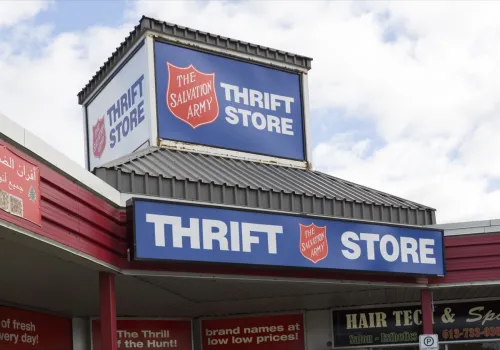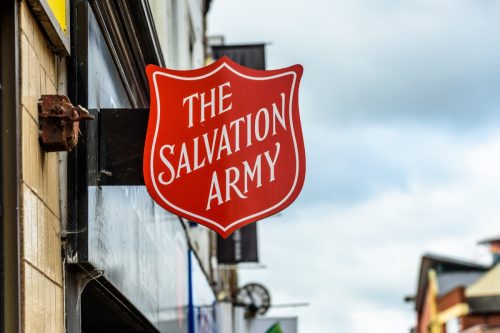This Popular Discount Chain Is Closing Stores, Starting June 27
Budget-conscious shoppers might be out of luck in certain areas.

Shoppers have not had it easy the past few years. From risking COVID exposure to dealing with endless supply chain setbacks, just going to the store has become a new kind of challenge. It doesn't help that prices are currently higher than ever, as record-breaking inflation has pushed the costs of most items up substantially. Now, there may be another obstacle hitting customers who are looking to be thrifty. One popular discount chain is planning to close some of its locations in the coming weeks. Read on to find out what stores are disappearing.
READ THIS NEXT: This Iconic Chain Is Closing Stores, Starting Tomorrow.
A number of low-cost retailers have had to shut down stores recently.

Overall, discount and low-cost stores appear to be doing quite well. The biggest dollar store companies—Dollar General, Dollar Tree, and Family Dollar—made up almost half of all new store openings for the U.S. in 2021, according to CNBC. But for one reason or another, even these retailers have had to turn the lights off at some locations.
On June 17, Family Dollar permanently closed a location in James City, North Carolina, and following a temporary closure of more than 400 stores, the company is also shutting down a distribution center in West Memphis, Arkansas. Earlier this month, it was also reported that Dollar General will be closing one of its stores soon. According to the Mansfield News Journal, a Dollar General Market—which is usually double the size of the company's regular stores—located in the West Park Shopping Center in Mansfield, Ohio, will get shuttered on July 18.
And for bargain hunters, the closures are far from over.
Now another discount chain is closing locations.

Based on local reports, it appears that the Salvation Army is also gearing up to close some of its locations around North America. A Salvation Army in Duluth, Minnesota will officially close its thrift store on July 1, Fox 21 News reported. "We want to let people know that, as the Salvation Army, our services are not ending, we just cannot do a retail store," Captain Teri Ellison told the news outlet, noting that the store was closing after 40 years due to financial loss and lack of staff.
Other closures will happen even sooner. The Salvation Army is ceasing all operations in Thompson, a city in Manitoba, Canada, on June 27, according to the Thompson Citizen. Unlike the Duluth shutdown, this closure impacts the organization's entire presence in the area, which includes a thrift store and food bank.
Major Al Hoeft, a spokesperson for the Salvation Army Prairie Division, told the newspaper that a variety of factors played into the organization's decision to leave Thompson. "Over the last decade, there have been several communities that we've had to cease operations," Hoeft said. "And this is just, at this point, the next one. It's unfortunate but it's sort of the reality of the work that we're in, that there do come times when we need to make the difficult decision to leave a community."
For more retail news delivered straight to your inbox, sign up for our daily newsletter.
The Salvation Army is also being impacted by inflation right now.

Inflation has skyrocketed in the U.S. recently, with the consumer price index (CPI) climbing up 8.6 percent in May 2022 compared to the same time last year—the highest increase in more than 40 years, according to CNBC. And second-hand stores are not immune to the fallout. Greg Tuck, the assistant national community relations and development secretary at The Salvation Army USA, told The Wall Street Journal in May that while prices at the charity's thrift stores are set by individual locations, they have gone up at some.
This might be confusing for shoppers, as stores like the Salvation Army do not have to purchase their inventory and instead acquire their products through tax-deductible donations, per The Wall Street Journal. But as with all stores, they do have to pay for other operational factors like staffing, utilities, and rent. "We are always trying to make sure that people are earning a livable wage," Tuck told the newspaper.
The company is still working to reassure its customers.

Despite closing stores and increasing costs, the Salvation Army is still working to provide its standard service for customers. According to Tuck, the company's stores are not raising prices that are unreasonable for frugal shoppers. "We've got to make sure that there's stuff for them that is affordable," he told The Wall Street Journal, adding that $1 t-shirts and $5 jackets are not disappearing.
Another concern among these shoppers right now is that thrift stores are going to run out of inventory as more people turn to second-hand shopping, especially amid rising inflation. "I don't think we'll ever be in a place where we don't have stuff," Tuck assured customers in his interview with the newspaper. "Part of our culture in America is that we are consumers and we are replacers, and we just hope that the public always see us as a viable place to make those kinds of donations."
READ THIS NEXT: This Iconic Restaurant Chain Just Closed Its Last Location.





















